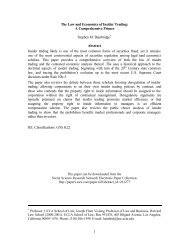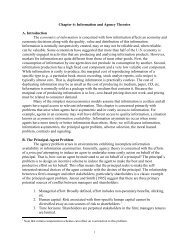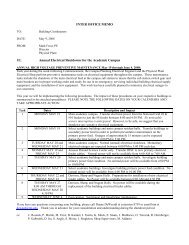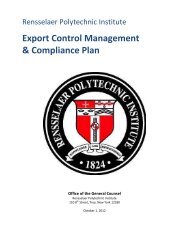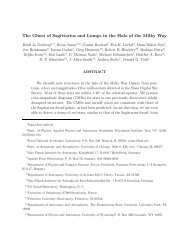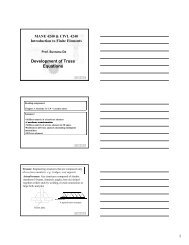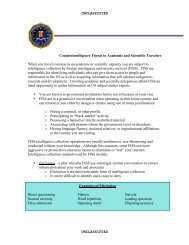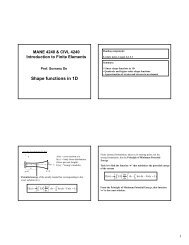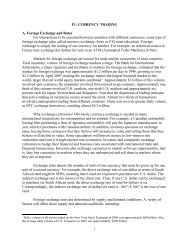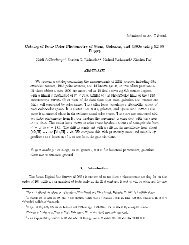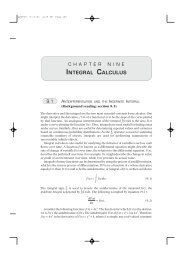Quiet Crisis - Building Engineering and Science Talent
Quiet Crisis - Building Engineering and Science Talent
Quiet Crisis - Building Engineering and Science Talent
Create successful ePaper yourself
Turn your PDF publications into a flip-book with our unique Google optimized e-Paper software.
A quiet crisis is building in the United States.There<br />
is a rapidly growing imbalance between supply <strong>and</strong><br />
dem<strong>and</strong> of technically skilled workers.<br />
The <strong>Quiet</strong> <strong>Crisis</strong><br />
Falling Short in Producing American Scientific <strong>and</strong> Technical <strong>Talent</strong><br />
There is a quiet crisis building in the United States — a crisis<br />
that could jeopardize the nation’s pre-eminence <strong>and</strong><br />
well-being. The crisis has been mounting gradually, but<br />
inexorably, over several decades. If permitted to continue<br />
unmitigated, it could reverse the global leadership<br />
Americans currently enjoy.<br />
The crisis stems from the gap between the nation’s growing<br />
need for scientists, engineers, <strong>and</strong> other technically skilled<br />
workers, <strong>and</strong> its production of them. As the generation educated<br />
in the 1950s <strong>and</strong> 1960s prepares to retire, our colleges<br />
<strong>and</strong> universities are not graduating enough scientific <strong>and</strong> technical<br />
talent to step into research laboratories, software <strong>and</strong><br />
other design centers, refineries, defense installations, science<br />
policy offices, manufacturing shop floors <strong>and</strong> high-tech startups.<br />
This “gap” represents a shortfall in our national scientific<br />
<strong>and</strong> technical capabilities.<br />
The need to make the nation safer from emerging terrorist<br />
threats that endanger the nation’s people, infrastructure, economy,<br />
health, <strong>and</strong> environment, makes this gap all the more<br />
critical <strong>and</strong> the need for action all the more urgent.<br />
We ignore this gap at our peril. Closing it will require a national<br />
commitment to develop more of the talent of all our citizens,<br />
especially the under-represented majority - the women, minorities,<br />
<strong>and</strong> persons with disabilities who comprise a<br />
disproportionately small part of the nation’s science, engineering,<br />
<strong>and</strong> technology workforce.<br />
The American public has not focused on the quiet crisis<br />
because we have grown accustomed to the fruits of technology.<br />
The technological advances of the past 100 years created<br />
a cornucopia of riches that have dramatically altered the quality<br />
<strong>and</strong> nature of daily life. Few Americans can remember life<br />
before electricity <strong>and</strong> electronics; ground, air, <strong>and</strong> space transport;<br />
radio <strong>and</strong> television broadcast; telephonics <strong>and</strong> satellite<br />
communications; medical technologies <strong>and</strong> imaging for diagnostics,<br />
treatment, prevention, <strong>and</strong> health assurance; laser <strong>and</strong><br />
fiber optic, petrochemical, <strong>and</strong> nuclear technologies. 1<br />
A Golden Age of Prosperity<br />
The U.S.-led surge in information technology that began in the<br />
early 1990s fostered a shared sense that prosperity could be<br />
taken for granted. Then-new technologies such as the World<br />
Wide Web, e-mail, <strong>and</strong> reasonably priced microprocessors<br />
boosted American productivity <strong>and</strong> spread rapidly through<br />
most segments of the economy. Life for many Americans was<br />
comfortable, safe, healthy, convenient, relatively wealthy, <strong>and</strong><br />
thoroughly endowed with choice <strong>and</strong> consistency. The golden<br />
continuity of prosperity — together with the break-up of the<br />
Soviet Union <strong>and</strong> the triumph of market-based economics —<br />
signaled a new millennium in which the foundation of U.S.<br />
strength could be assumed.<br />
The assumption of continued progress — even American<br />
invincibility — was shattered on September 11, 2001. The hard<br />
questions that have been asked since then have centered on<br />
the immediate capacity of the nation to fight terrorism. But the<br />
current natural focus on intelligence capabilities <strong>and</strong> defense<br />
preparedness should not overshadow the most fundamental of<br />
questions. Is the United States developing the human capital to<br />
remain the world’s most productive economy while at the same<br />
time meeting a formidable new national security threat?<br />
The Council on Competitiveness, which for 15 years has studied<br />
the capacity of the nation to support high-wage jobs <strong>and</strong><br />
win in global markets, has shown how much scientific <strong>and</strong><br />
technical talent contribute to national economic performance.<br />
Greatest <strong>Engineering</strong> Achievements of the 20th Century 1<br />
1. Electrification<br />
2. Automobile<br />
3. Airplane<br />
4. Water Supply <strong>and</strong> Distribution<br />
5. Electronics<br />
6. Radio <strong>and</strong> Television<br />
7. Agricultural Mechanization<br />
8. Computers<br />
9. Telephone<br />
10. Air Conditioning <strong>and</strong><br />
Refrigeration<br />
11. Highways<br />
12. Spacecraft<br />
13. Internet<br />
14. Imaging<br />
15. Household Appliances<br />
16. Health Technologies<br />
17. Petroleum <strong>and</strong> Petrochemical<br />
Technologies<br />
18. Laser <strong>and</strong> Fiber Optics<br />
19. Nuclear Technologies<br />
20. High-performance Materials<br />
1<br />
Greatest <strong>Engineering</strong> Achievements of the 20th Century, National Academy of <strong>Engineering</strong>, www.greatachievements.org/greatachievements/indexp.html.<br />
1



